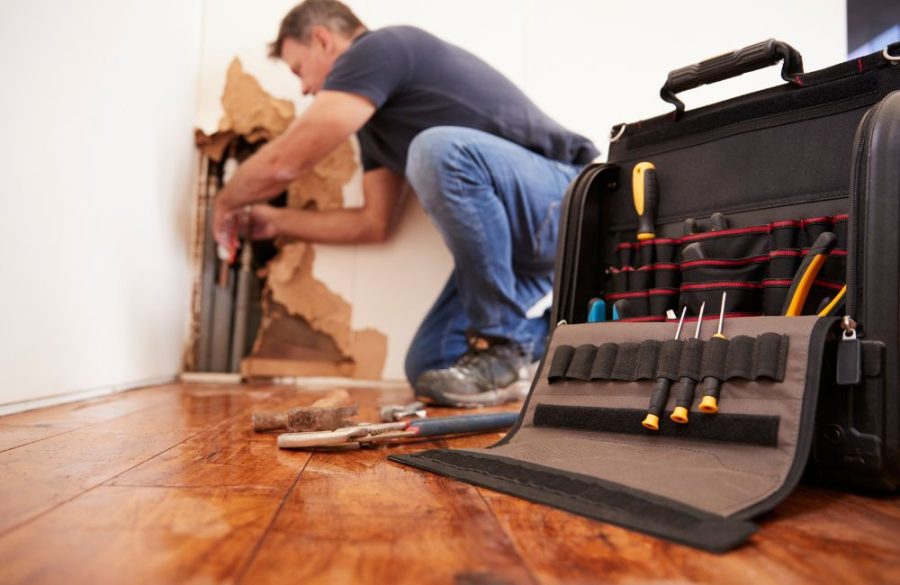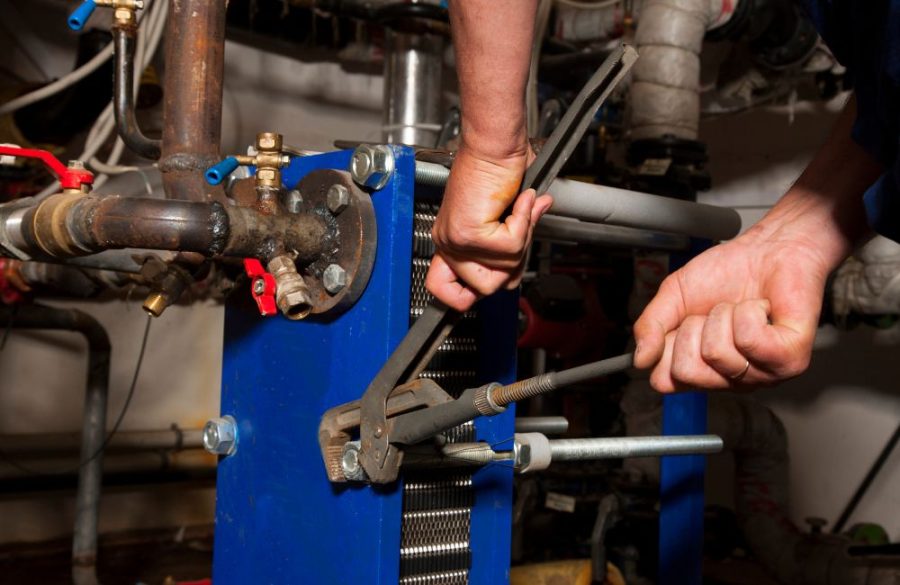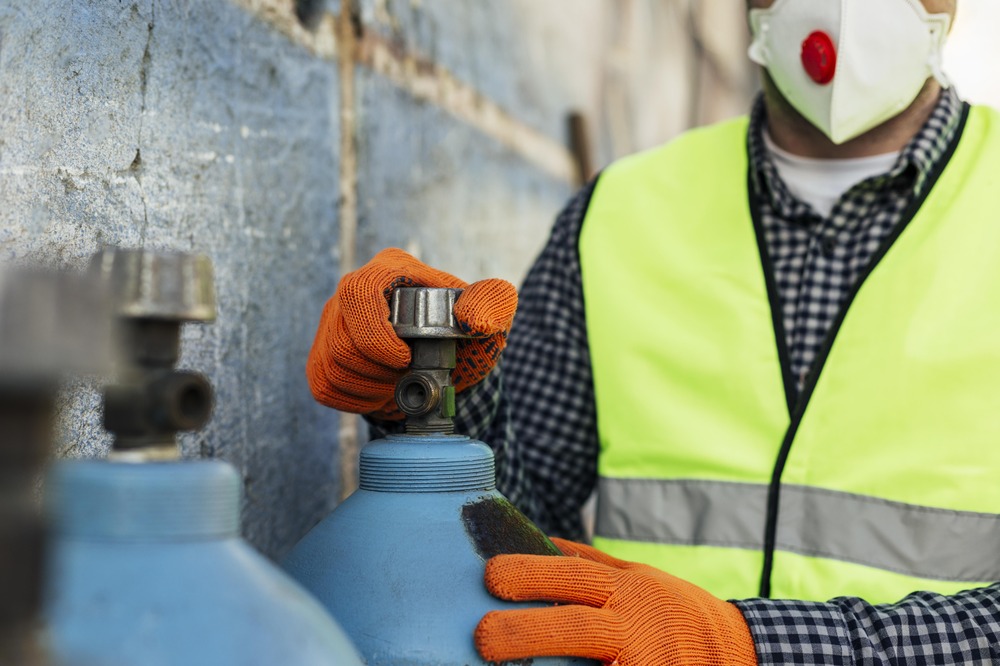In many homes, gas lines power appliances such as stoves, heaters, and water systems. However, issues with gas lines can lead to serious safety risks, including fires, explosions, and health hazards. Knowing when to call an emergency plumber can save lives, prevent property damage, and avoid costly repairs.
Here are five critical signs of gas line problems and steps homeowners can take to protect themselves and their families.
Table of Contents
Key Takeaways✔ A distinct sulfur-like or rotten egg smell clearly indicates a gas leak, requiring immediate services. ✔ Unusual noises near gas lines, like hissing or whistling, suggest gas is escaping through cracks or loose connections. ✔ Dead or discolored vegetation, especially near gas lines, could indicate an underground gas leak. ✔ Sudden health issues like headaches, dizziness, nausea, or fatigue among household members may signal gas exposure. ✔ A sudden, unexplained increase in gas bills without additional usage points to a possible gas leak. |
What are Gas Line Problems?
Gas line issues can develop over time due to various factors, such as corrosion, natural wear and tear, or accidental damage. These problems often go unnoticed until they become severe, making it crucial to understand the risks and warning signs.
On average, a significant new gas leak is reported to the federal government every 40 hours, while smaller leaks often remain unnoticed and unresolved for years. Gas leaks, in particular, can result in a wide range of risks, including those that are damaging to the property and family members.
5 Signs You Need to Call an Emergency Plumber for Gas Line Problems
Gas line problems can manifest in several ways, often signaling dangerous conditions that require immediate attention. Recognizing these signs early is essential to prevent health hazards, environmental damage, or catastrophic property loss. Here are five critical signs that it’s time to call an emergency plumber for these serious issues:

1. You Notice a Strong, Unusual Smell
One of the earliest and most noticeable indicators of a gas leak is a distinct sulfur-like odor, often compared to rotten eggs. This smell is added to natural gas to alert homeowners of leaks before they reach dangerous levels.
Causes
- Loose Fittings: Improperly sealed connections allow gas to escape into the air. This often happens when installation or maintenance is not done professionally.
- Damaged Pipelines: Corrosion, wear and tear, or accidental damage can create leaks. Such damage may occur due to shifting ground, poor materials, or aging infrastructure.
Risks of Ignoring the Smell
- Explosion Risk: Accumulated gas can ignite from a single spark, causing severe property damage or injury. Even small leaks can lead to catastrophic outcomes if left unattended.
- Health Hazards: Continuous exposure may lead to respiratory problems, nausea, and dizziness. These health effects can escalate with prolonged exposure, posing significant risks to vulnerable family members like children or the elderly.
2. You Hear Hissing or Whistling Sounds
Gas leaks are not always silent. If you hear hissing or whistling sounds near appliances or gas lines, it’s likely gas is escaping through a crack, hole, or loose connection and this needs immediate attention from an emergency plumber.
Causes
- Pressure Leaks: Faulty pipes or fittings may fail to contain high-pressure gas. This is common in older systems where components are no longer able to withstand the pressure.
- Wear and Tear: Aging gas lines may develop small cracks or holes over time. These issues can worsen due to environmental factors like temperature fluctuations or soil erosion so you need to call an emergency plumber immediately.
Risks
- Rapid Gas Loss: High-pressure leaks can result in a significant and dangerous buildup of gas. This rapid accumulation increases the likelihood of an explosion or fire.
- Structural Damage: Escaped gas can seep into walls, floors, or other structural materials, creating hidden hazards. These structural issues can be costly to repair and may require significant reconstruction if ignored.
3. Plants Near Your Home Are Dying Unexpectedly
Dead or discolored vegetation near your home could indicate an underground gas leak. Leaking gas displaces oxygen in the soil, suffocating plant roots and causing them to wither.
Additional Warning Signs in Plants
- Discolored Grass: Yellow or brown patches of grass in an otherwise green lawn may indicate a leak.
- Wilting Shrubs: Shrubs or bushes near buried gas lines that suddenly droop or lose their leaves could be affected.
- Soil Disruption: Gas leaks may also cause bubbling or unusually soft patches of soil.
Risks
- Environmental Damage: Underground leaks can contaminate the soil and harm surrounding vegetation. This can result in long-term damage to your landscaping and nearby ecosystems.
- Structural Weakening: Prolonged gas leakage may erode the soil and destabilize foundations or other structures. In extreme cases, this could compromise the safety of your home.
4. You or Your Family Are Experiencing Unexplained Health Symptoms
Natural gas exposure can cause various physical symptoms, often resembling common illnesses. If multiple family members experience these symptoms indoors, it’s a likely indicator of a gas leak.
Common Symptoms of Gas Exposure
- Persistent headaches that worsen indoors.
- Dizziness, lightheadedness, or confusion.
- Fatigue and lethargy, even after resting.
- Nausea or vomiting, particularly if symptoms are unexplained.
Causes
- Leaking Connections: Faulty fittings near appliances or pipelines can allow gas to escape into the home. These leaks often go unnoticed until symptoms arise.
- Improper Ventilation: Poorly maintained appliances or blocked vents may cause gas to accumulate indoors. This is especially common in older homes where ventilation systems are outdated or damaged.
Risks
- Carbon Monoxide Poisoning: Exposure to natural gas can lead to a buildup of carbon monoxide, which is odorless, invisible, and deadly. This is particularly dangerous during sleep, as it can cause unconsciousness or worse before symptoms are noticed.
- Respiratory Issues: Long-term exposure can exacerbate asthma, bronchitis, or other respiratory conditions. Over time, this can lead to chronic health issues that may require medical intervention.
5. Your Gas Bill Has Skyrocketed Without Explanation
A sudden, unexplained spike in your gas bill could be a sign of a leak. Damaged gas lines cause continuous leakage, leading to increased consumption and wasted energy.
Causes
- Damaged Lines: Cracks or breaks in pipes allow gas to escape steadily. These issues often occur due to aging infrastructure or environmental wear.
- Faulty Appliances: Gas-powered appliances with leaks or malfunctions can consume more gas than necessary. Improper installation or lack of maintenance can exacerbate these problems.
Risks
- Increased Costs: Wasted gas results in unnecessarily high utility bills. Over time, these financial losses can become substantial if the leak is not repaired.
- Fire Hazard: Persistent leaks, if left unaddressed, create a flammable environment over time. This risk is especially pronounced in confined spaces where gas can accumulate unnoticed.
- Health Issues: Prolonged exposure to leaking gas can lead to serious health concerns, including headaches, dizziness, nausea, and, in severe cases, carbon monoxide poisoning.
What to Do When You Spot These Signs
Recognizing the warning signs is only the first step. Knowing how to respond appropriately can make all the difference between mitigating the problem safely and allowing it to escalate. Here’s what homeowners should do:
- Evacuate Immediately: Leave the property and ensure all family members, including pets, are safe. Avoid lingering to investigate the source of the issue, as this can expose homeowners to harmful gases or potentially hazardous conditions. It’s better to prioritize safety and assess the situation from a secure location.
- Avoid Using Electrical Devices: Do not turn on lights, use appliances, or create sparks, as these actions could ignite the gas and cause an explosion. Even actions as simple as unplugging devices or using a cell phone indoors can pose a serious risk in the presence of a gas leak.
- Call Emergency Services: If the leak is severe, contact the local fire department or gas company for immediate assistance. They can provide guidance on securing the area and may send a team to manage the situation before the plumber arrives. Promptly notifying these services can minimize the risk to your home and neighborhood.
- Contact an Emergency Plumber: Reach out to a licensed professional to inspect and repair the gas line. A skilled emergency plumber has the expertise and equipment to locate leaks accurately and restore the gas system safely. Explain the urgency of the situation when making the call.
- Communicate Clearly: Provide detailed information about the signs, such as unusual smells, hissing sounds, or unexplained symptoms. Be as specific as possible about the location and nature of the issue to help the plumber prepare appropriately and address the problem efficiently upon arrival.

How an Emergency Plumber Resolves Gas Line Problems
The plumbing industry in the United States reached a market size of $121.5 billion in 2024, reflecting the growing demand for skilled professionals to address critical issues like gas line problems.
Emergency plumbers are equipped with the tools, knowledge, and experience needed to handle gas line issues safely and efficiently. Their expertise ensures that gas leaks are addressed quickly to prevent further damage or danger. Here’s how they approach the problem:
Leak Detection
- Use Precision Tools: Use advanced tools like gas detectors and pressure gauges to locate leaks with precision. These tools allow emergency plumbers to identify even minor leaks that may otherwise go unnoticed.
- Inspect Thoroughly: Perform a thorough inspection of both visible and underground gas lines to ensure the entire system is evaluated. Specialized equipment like ultrasonic detectors may be used for hard-to-reach areas.
Repair or Replacement
- Fix Quickly: Fix minor issues, such as loose fittings or small cracks, on the spot to prevent the problem from escalating.
- Upgrade Materials: Replace severely damaged or corroded sections of the gas line to ensure long-term safety and system integrity. An emergency plumber uses materials like high-quality polyethylene pipes that are often used to enhance durability.
Testing and Verification
- Perform Pressure Tests: Conduct pressure tests to confirm that the repaired gas line is secure and capable of handling normal usage without leaks.
- Monitor Effectively: An emergency plumber monitors the system for any remaining signs of leakage using advanced diagnostic equipment. This ensures that the repairs are comprehensive and effective.
Emergency Shutoff Installation
- Add Shutoff Valves: Install emergency shutoff valves to allow homeowners to quickly stop the flow of gas during a leak. These valves can be life-saving in situations where gas escapes rapidly.
- Educate Homeowners: An emergency plumber can help teach homeowners on how to use shutoff systems effectively, giving them an extra layer of safety before a professional arrives.
System Upgrades
- Implement System Upgrades: Recommend and implement system upgrades, such as replacing outdated or substandard gas lines, to improve overall safety and efficiency. Many older homes have gas systems that may not meet current safety standards, making upgrades a critical step.
- Install Modern Fittings: An emergency plumber can install modern fittings and connections that reduce the likelihood of leaks or malfunctions in the future.
Emergency Response Preparedness
- Develop Quick-Response Plans: Develop a quick-response plan to handle emergencies efficiently. Emergency plumbers often prioritize immediate cases to ensure homeowners receive timely service during critical situations.
- Provide Action Checklists: Provide homeowners with a checklist of actions to take while waiting for professional assistance, such as turning off the main gas valve and ventilating the area safely.
Common Ways to Prevent Gas Line Problems
Proactively maintaining and upgrading your gas system is essential for ensuring safety, avoiding costly repairs, and reducing potential hazards. By following these preventative measures with the help of emergency plumbers, you can safeguard your home and loved ones from the risks associated with gas line issues:
- Regular Maintenance: Regular inspections are vital to identify and address issues like wear and tear, corrosion, or leaks in gas lines and appliances before they escalate. Annual check-ups by certified technicians can ensure the system operates safely and efficiently.
- Safe Digging Practices: Before any construction or landscaping work, contact local utility companies to mark underground gas lines. This step prevents accidental damage to pipes, which can cause dangerous leaks and costly repairs.
- Proper Installation: Always hire licensed and experienced emergency plumbers for gas line installations or repairs. This ensures compliance with safety regulations, reduces the risk of faulty connections, and provides peace of mind that the work is done correctly.
- Upgrade Old Infrastructure: Over time, gas lines and appliances can deteriorate, leading to safety concerns. Replacing them with modern, durable materials and energy-efficient models minimizes risks and enhances the overall safety and performance of your gas system.
- Leak Detectors: Installing gas leak detectors in your home provides an added layer of safety. These devices monitor gas levels and sound alarms when leaks are detected, allowing for prompt action to prevent accidents or health hazards.
Frequently Asked Questions
Can an emergency plumber repair gas appliances?
Yes, emergency plumbers are trained to repair gas-powered appliances such as stoves, water heaters, and furnaces when the issue is related to the gas line or connection. They can identify whether the problem stems from the appliance itself or a faulty gas line. Once diagnosed, they will ensure the repair is done safely and according to the code.
How do I know if my gas line needs to be replaced?
Frequent leaks, visible corrosion, and outdated piping materials are common indicators that your gas line may need to be replaced. Reduced efficiency in gas-powered appliances can also signal a deeper issue with the line. Consulting an emergency plumber will help determine whether repairs or a full replacement is the best course of action.
Is a gas line leak covered by homeowners’ insurance?
Coverage for gas line leaks varies depending on your insurance policy and provider. Some policies may cover damages caused by a leak but not the cost of repairing or replacing the gas line itself. It’s important to review your policy and consult your provider to understand your specific coverage.
How long does it take for an emergency plumber to fix a gas leak?
The time required to fix a gas leak depends on the severity and location of the issue. Minor leaks in accessible areas can often be repaired within a few hours, while more complex cases involving underground lines or extensive damage may take longer. An experienced emergency plumber will assess the situation and provide an estimated timeline for the repair.
How often should I have my gas lines inspected?
It is recommended to have your gas lines professionally inspected every 1-2 years, especially if your home is older or has undergone structural changes. Regular inspections can catch potential problems early, preventing costly repairs or dangerous emergencies. A licensed emergency plumber can ensure your gas system remains safe and efficient.
Ensure Your Safety with Expert Plumbing Services Today!
If you need professional gas pipe services, L&P Plumbing in Torrington, CT, is here to help. Specializing in gas piping for stand-by generators, our experienced team ensures safe and efficient installations tailored to your specific needs. Whether your property already has existing gas service or requires a new install, L&P Plumbing in Torrington, CT, has the expertise to guide you through the process.
Don’t wait—contact our emergency plumbers in Torrington, CT, today to schedule your service!

